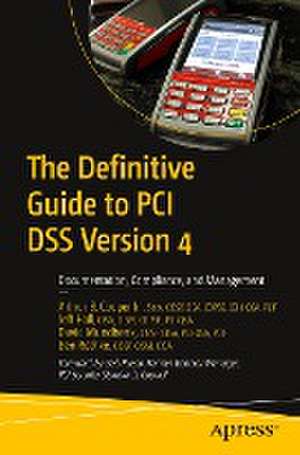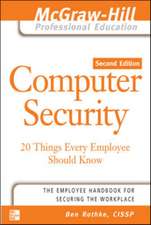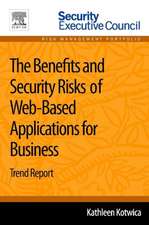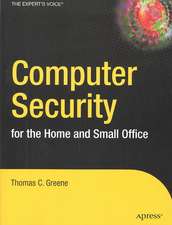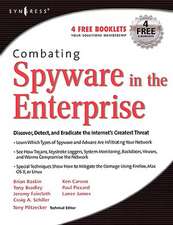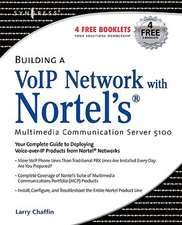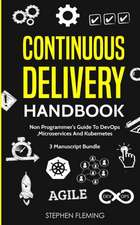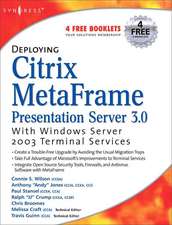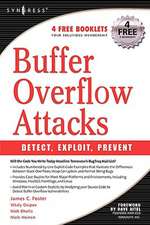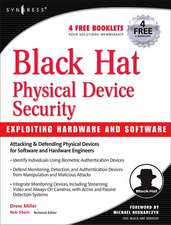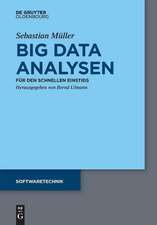The Definitive Guide to PCI DSS Version 4: Documentation, Compliance, and Management
Autor Arthur B. Cooper Jr., Jeff Hall, David Mundhenk, Ben Rothkeen Limba Engleză Paperback – 25 mai 2023
Any merchant or service provider that stores, processes, or transmits credit card data must comply with the PCI Data Security Standard. PCI DSS 1.0 was first published in 2004, yet many of those tasked with PCI compliance still encounter difficulties when trying to make sense of it. PCI DSS version 4 was published in March 2022, and at 360 pages, it has numerous additional requirements, leaving many people struggling to know what they need to do to comply.
PCI DSS v4.0 has a transition period in which PCI DSS version 3.2.1 will remain active for two years from the v4.0 publication date. Although the transition period ends on March 31, 2024, and may seem far away, those tasked with PCI compliance will need every bit of the time to acquaint themselves with the many news updates, templates, forms, and more, that PCI v4.0 brings to their world.
What You’ll Learn
Who This Book Is For
Compliance managers and those tasked with PCI compliance, information security managers, internal auditors, chief security officers, chief technology officers, and chief information officers. Readers should have a basic understanding of how credit card payment networks operate, in addition to basic security concepts.
What You’ll Learn
- Know what it takes to be PCI compliant
- Understand and implement what is in the PCI DSS
- Get rid of cardholder data
- Everything you need to know about segmenting your cardholder data network
- Know what documentation is needed for your PCI compliance efforts
- Leverage real-world experience to assist PCI compliance work
Who This Book Is For
Compliance managers and those tasked with PCI compliance, information security managers, internal auditors, chief security officers, chief technology officers, and chief information officers. Readers should have a basic understanding of how credit card payment networks operate, in addition to basic security concepts.
Preț: 301.55 lei
Preț vechi: 376.94 lei
-20% Nou
Puncte Express: 452
Preț estimativ în valută:
57.70€ • 60.24$ • 47.76£
57.70€ • 60.24$ • 47.76£
Carte disponibilă
Livrare economică 15-29 martie
Preluare comenzi: 021 569.72.76
Specificații
ISBN-13: 9781484292877
ISBN-10: 1484292871
Pagini: 253
Ilustrații: XXIV, 253 p. 12 illus.
Dimensiuni: 155 x 235 mm
Greutate: 0.43 kg
Ediția:1st ed.
Editura: Apress
Colecția Apress
Locul publicării:Berkeley, CA, United States
ISBN-10: 1484292871
Pagini: 253
Ilustrații: XXIV, 253 p. 12 illus.
Dimensiuni: 155 x 235 mm
Greutate: 0.43 kg
Ediția:1st ed.
Editura: Apress
Colecția Apress
Locul publicării:Berkeley, CA, United States
Cuprins
Chapter 1. A Brief History of PCI.- Chapter 2. Install and Maintain Network Controls.- Chapter 3. Apply Secure Configurations to all System Components- Chapter 4. Protect Stored Account Data.- Chapter 5. Protect Cardholder Data with Strong Cryptography During Transmission Over Open, Public Networks.- Chapter 6. Protect All Systems and Networks from Malicious Software.- Chapter 7. Develop and Maintain Secure Systems and Software.- Chapter 8. Restrict Access to System Components and Cardholder Data by Business Need to Know.- Chapter 9. Identify Users and Authenticate Access to System Components.- Chapter 10. Restrict Physical Access to Cardholder Data.- Chapter 11. Log and Monitor All Access to System Components and Cardholder Data.- Chapter 12. Test Security of Systems and Networks Regularly.- Chapter 13. Support Information Security with Organizational Policies and Programs.- Chapter 14. How To Read a Service Provider Attestation of Compliance.- Chapter 15. Segmentation and tokenization.- Chapter 16. The Customized Approach, Compensating Controls, and the Targeted Risk Analysis.
Notă biografică
Arthur B. Cooper Jr. ("Coop") is Principal Security Consultant at TrustedSec. He has 44 years of experience in information technology with the last 17 years focused on the security of payment systems and architectures, ecommerce, payment application assessments, forensic investigations, compliance security assessments, development of secure network architectures, risk management programs, security governance initiatives, and regulatory compliance. Coop was a member of the US Air Force for most of his young adult life and had direct experience with the original ARPANET and ARPANET 1822 Protocols. He was directly involved with the original DoD X.25 networks, the Defense Data Network (DDN), and the Automatic Digital Information Network (AUTODIN). He was directly involved with the original BBN Packet Switch Node (PSN) systems and has witnessed every major information technology “leap” or development since that time.Coop was the Standards Trainer for the Payment Card Industry Security Standards Council (PCI SSC) for three years from 2010 to 2013 and has been a consultant to some of the largest retail companies and financial institutions in the world. He has worked with businesses to improve their overall security posture and to meet compliance regulations such as PCI, HIPAA, GLBA, and SOX. Coop is an experienced team leader and IT security expert who can ensure timely and successful completion of projects, as well as an enthusiastic security engineer researching emerging security technologies, trends, and tools. His certifications include: Security +, CEH, CISA, CDPSE, CISSP, PCIP, and PCI QSA.Jeff Hall is Principal Security Consultant at Truvantis, Inc. He has over 30 years of technology and compliance project experience. Jeff has done a significant amount of work with financial institutions, and the health care, manufacturing, and distribution industries, including security assessments, strategic technology planning, and application implementation. He is part of the PCI Dream Team and is the writer of the PCI Guru blog, the definitive source for PCI DSS information.
David Mundhenk is Principal Security Consultant at the eDelta Consulting, as an information security, governance, risk, and compliance consultant with extensive multi-organizational experience providing a myriad of professional security services to business and government entities worldwide. He has worked as a computer and network system security professional for more than 30 years. David’s experience covers a broad spectrum of security disciplines, including security compliance assessments, security product quality assurance, vulnerability scanning, penetration testing, application security assessments, network and host intrusion detection/prevention, disaster and recovery planning, protocol analysis, formal security training instruction, and social engineering. He has successfully completed 200+ PCI DSS assessments and scores of PADSS assessments. Certifications include CISSP, CISA, QSA, PCIP.
Ben Rothke, CISSP, CISM, CISA is a New York city-based Senior Information Security Manager with Tapad and has over 20 years of industry experience in information systems security and privacy. His areas of expertise are in risk management and mitigation, security and privacy regulatory issues, design and implementation of systems security, encryption, cryptography, and security policy development. Ben is the author of the book Computer Security - 20 Things Every Employee Should Know, and writes security and privacy book reviews for the RSA Conference blog and Security Management. He is a frequent speaker at industry conferences, such as RSA and MISTI, is a member of ASIS, and InfraGard, and holds many security certifications, besides being an ISO 27001 lead auditor.
David Mundhenk is Principal Security Consultant at the eDelta Consulting, as an information security, governance, risk, and compliance consultant with extensive multi-organizational experience providing a myriad of professional security services to business and government entities worldwide. He has worked as a computer and network system security professional for more than 30 years. David’s experience covers a broad spectrum of security disciplines, including security compliance assessments, security product quality assurance, vulnerability scanning, penetration testing, application security assessments, network and host intrusion detection/prevention, disaster and recovery planning, protocol analysis, formal security training instruction, and social engineering. He has successfully completed 200+ PCI DSS assessments and scores of PADSS assessments. Certifications include CISSP, CISA, QSA, PCIP.
Ben Rothke, CISSP, CISM, CISA is a New York city-based Senior Information Security Manager with Tapad and has over 20 years of industry experience in information systems security and privacy. His areas of expertise are in risk management and mitigation, security and privacy regulatory issues, design and implementation of systems security, encryption, cryptography, and security policy development. Ben is the author of the book Computer Security - 20 Things Every Employee Should Know, and writes security and privacy book reviews for the RSA Conference blog and Security Management. He is a frequent speaker at industry conferences, such as RSA and MISTI, is a member of ASIS, and InfraGard, and holds many security certifications, besides being an ISO 27001 lead auditor.
Textul de pe ultima copertă
This book is your go-to reference on how to achieve PCI compliance. With more than 400 PCI requirements, the updated PCI Data Security Standard (PCI DSS) v4.0 does not detail the specific documentation that a PCI auditor—known as a Qualified Security Assessor (QSA)—needs to know. This book is the first reference to detail the specific documentation needed for every PCI requirement. The authors provide real-world examples of complying with the 12 main PCI requirements and clarify many of the gray areas within the PCI DSS.
Any merchant or service provider that stores, processes, or transmits credit card data must comply with the PCI Data Security Standard. PCI DSS 1.0 was first published in 2004, yet many of those tasked with PCI compliance still encounter difficulties when trying to make sense of it. PCI DSS version 4 was published in March 2022, and at 360 pages, it has numerous additional requirements, leaving many people struggling to know what they need to doto comply.
PCI DSS v4.0 has a transition period in which PCI DSS version 3.2.1 will remain active for two years from the v4.0 publication date. Although the transition period ends on March 31, 2024, and may seem far away, those tasked with PCI compliance will need every bit of the time to acquaint themselves with the many news updates, templates, forms, and more, that PCI v4.0 brings to their world.
You will:
You will:
- Know what it takes to be PCI compliant
- Understand and implement what is in the PCI DSS
- Get rid of cardholder data
- Have everything you need to know about segmenting your cardholder data network
- Know what documentation is needed for your PCI compliance efforts
- Leverage real-world experience to assist PCI compliance work
Caracteristici
Authored by four of the most recognized PCI experts Reviews detailed documentation requirements for each of the more than 400 PCI DSS requirements Includes practical details of real-world PCI use and compliance
